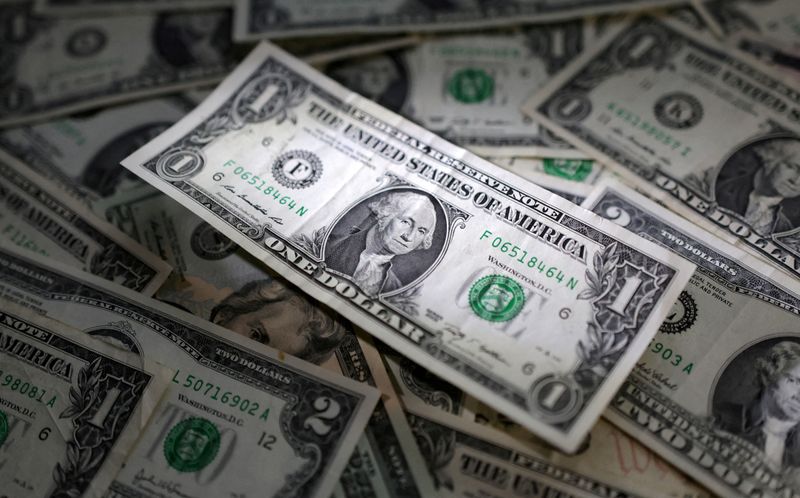 © Reuters. FILE PHOTO: U.S. dollar banknotes are seen in this illustration taken March 10, 2023. REUTERS/Dado Ruvic/Illustration/File Photo
© Reuters. FILE PHOTO: U.S. dollar banknotes are seen in this illustration taken March 10, 2023. REUTERS/Dado Ruvic/Illustration/File Photo
By Gertrude Chavez-Dreyfuss
NEW YORK (Reuters) -The dollar slid from a fresh three-month high against a major currency basket on Wednesday, as investors consolidated gains following the previous session's hotter-than-expected U.S. inflation report.
The inflation data for January pushed back bets on a first Federal Reserve rate cut to the middle of the year.
The greenback also weakened against the yen after Japan's top currency officials warned against what they described as rapid and speculative yen moves.
The dollar eased 0.2% to 150.52 yen , not too far from a three-month peak hit against the Japanese currency on Tuesday. The U.S. unit has added about 10 yen in price since the start of this year.
Since Tuesday's data showed that the U.S. consumer price index (CPI) gained 3.1% in January on a year-on-year basis, compared with an expected 2.9% rise, fed funds futures have priced in no rate cut in March and a nearly 80% chance of easing at the June meeting, according LSEG's rate probability app. Two weeks ago, markets had expected the first rate cut to happen in May.
Futures are also pricing in about three rate cuts of 25 basis points each this year, down from about five cuts two weeks earlier.
The dollar index, which measures the U.S. currency's value against six other major currencies, slipped 0.1% to 104.72, having touched a fresh three-month high of 104.97.
"The stronger dollar is now the path of least resistance. We don't think it's time yet to fade those moves," said Vassili Serebriakov, FX strategist, at UBS in New York.
"But things can change quickly and we have retail sales on Thursday, although we do expect a robust number again. That should support dollar strength."
Economists expect a 0.1% decline in U.S. retail sales in January, from a 0.6% rise in December, a Reuters poll showed.
UK INFLATION
Sterling was down 0.2% against the dollar at $1.2563, after briefly touching a more than one-week low, as data showed UK inflation did not accelerate in January as expected. This may relieve some of the pressure on the Bank of England (BoE) to keep rates steady for longer.
UK inflation stood at an annual rate of 4.0% in January, unchanged from December, but lower than economists' forecast for a 4.2% rise.
Money markets see a 51% chance of a BoE rate cut in June and a 75% chance of one in August, according to LSEG's rate probability app.
In Japan, Finance Minister Shunichi Suzuki told reporters the government is closely watching the currency market, particularly dollar/yen, adding that "rapid moves are undesirable for the economy."
Earlier, Japan's top currency diplomat Masato Kanda said the nation would take appropriate actions on forex if needed.
Japan intervened in the currency market three times in 2022 when the yen plunged to 32-year lows near 152 to the dollar, buying dollars and selling the Japanese unit.
Elsewhere, the euro gained 0.2% against the dollar to $1.0720 amid a slew of euro zone economic data. It earlier touched a fresh three-month low of $1.0695.
Euro zone employment rose 0.3% quarter-on-quarter and 1.3% year-on-year in the fourth quarter. According to a Reuters poll, employment was expected to rise 0.2% quarter-on-quarter and 1.1% year-on-year.
Data also showed economic growth in the region was flat in the last three months of 2023 compared with the previous quarter and up 0.1% versus the same period in 2022.
In cryptocurrencies, bitcoin rose 4.1% to $51,612, hitting its highest since December 2021 above $52,000.
(Reporting Gertrude Chavez-Dreyfuss; Additional reporting by Joice Alves in London and Kevin Buckland in Tokyo; Editing by Mark Heinrich, Kirsten Donovan and Marguerita Choy)

